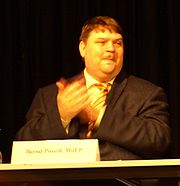
Bernd Posselt
Encyclopedia

Germany
Germany , officially the Federal Republic of Germany , is a federal parliamentary republic in Europe. The country consists of 16 states while the capital and largest city is Berlin. Germany covers an area of 357,021 km2 and has a largely temperate seasonal climate...
politician
Politician
A politician, political leader, or political figure is an individual who is involved in influencing public policy and decision making...
(CSU) and a son of expellees
Heimatvertriebene
Heimatvertriebene are those around 12 million ethnic Germans who fled or were expelled after World War II from parts of Germany annexed by Poland and Russia, and from other countries, who found refuge in both West and East Germany, and Austria...
.
Posselt was born in Pforzheim
Pforzheim
Pforzheim is a town of nearly 119,000 inhabitants in the state of Baden-Württemberg, southwest Germany at the gate to the Black Forest. It is world-famous for its jewelry and watch-making industry. Until 1565 it was the home to the Margraves of Baden. Because of that it gained the nickname...
, Baden-Württemberg
Baden-Württemberg
Baden-Württemberg is one of the 16 states of Germany. Baden-Württemberg is in the southwestern part of the country to the east of the Upper Rhine, and is the third largest in both area and population of Germany's sixteen states, with an area of and 10.7 million inhabitants...
. He has been a Member of the European Parliament
Member of the European Parliament
A Member of the European Parliament is a person who has been elected to the European Parliament. The name of MEPs differ in different languages, with terms such as europarliamentarian or eurodeputy being common in Romance language-speaking areas.When the European Parliament was first established,...
since 1994. In 1998 he became president of the Paneuropa-Union Deutschland, the German branch of the International Paneuropean Union
International Paneuropean Union
The International Paneuropean Union claims to be the oldest European unification movement and is also referred to as the Paneuropean Movement and the Pan-Europa Movement...
.
Posselt is the leading German advocate of the rights of those Germans whose ancestors lived in the Sudetenland
Sudetenland
Sudetenland is the German name used in English in the first half of the 20th century for the northern, southwest and western regions of Czechoslovakia inhabited mostly by ethnic Germans, specifically the border areas of Bohemia, Moravia, and those parts of Silesia being within Czechoslovakia.The...
district of Bohemia
Bohemia
Bohemia is a historical region in central Europe, occupying the western two-thirds of the traditional Czech Lands. It is located in the contemporary Czech Republic with its capital in Prague...
as well as Moravia
Moravia
Moravia is a historical region in Central Europe in the east of the Czech Republic, and one of the former Czech lands, together with Bohemia and Silesia. It takes its name from the Morava River which rises in the northwest of the region...
and who were expelled by the Potsdam conference
Potsdam Conference
The Potsdam Conference was held at Cecilienhof, the home of Crown Prince Wilhelm Hohenzollern, in Potsdam, occupied Germany, from 16 July to 2 August 1945. Participants were the Soviet Union, the United Kingdom, and the United States...
and the governments in Central and Eastern Europe after the Second World War. His main goal - and the principal aim of the Sudetendeutsche Landsmannschaft
Sudetendeutsche Landsmannschaft
The Sudetendeutsche Landsmannschaft is an organization representing Sudeten German refugees from the Sudetenland. Most of them fled to West Germany from Czechoslovakia during the Expulsion of Germans after World War II....
that he has led since 2000 - is to revoke the so-called Beneš decrees
Beneš decrees
Decrees of the President of the Republic , more commonly known as the Beneš decrees, were a series of laws that were drafted by the Czechoslovak Government-in-Exile in the absence of the Czechoslovak parliament during the German occupation of Czechoslovakia in World War II and issued by President...
, as well as other acts of the post-war expulsion
Expulsion of Germans after World War II
The later stages of World War II, and the period after the end of that war, saw the forced migration of millions of German nationals and ethnic Germans from various European states and territories, mostly into the areas which would become post-war Germany and post-war Austria...
s that were meant to punish the German population in the Sudetenland as a whole for its prevailing support of Nazism
Nazism
Nazism, the common short form name of National Socialism was the ideology and practice of the Nazi Party and of Nazi Germany...
.
Posselt is respected in the Sudeten German community and in his home state of Bavaria
Bavaria
Bavaria, formally the Free State of Bavaria is a state of Germany, located in the southeast of Germany. With an area of , it is the largest state by area, forming almost 20% of the total land area of Germany...
. The conservative
Conservatism
Conservatism is a political and social philosophy that promotes the maintenance of traditional institutions and supports, at the most, minimal and gradual change in society. Some conservatives seek to preserve things as they are, emphasizing stability and continuity, while others oppose modernism...
Bavarian government has often supported the Sudeten German community, and was among those demanding that the Czech Republic should repeal the Beneš decrees before being allowed into European Union
European Union
The European Union is an economic and political union of 27 independent member states which are located primarily in Europe. The EU traces its origins from the European Coal and Steel Community and the European Economic Community , formed by six countries in 1958...
. No politician in the Czech Republic
Czech Republic
The Czech Republic is a landlocked country in Central Europe. The country is bordered by Poland to the northeast, Slovakia to the east, Austria to the south, and Germany to the west and northwest....
is willing to negotiate with Posselt.

